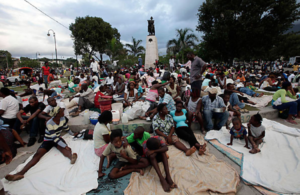The book that I read for our class book reviews is Letters Left Unsent by J. It was fairly recently published in 2014 and is a shorter non-fiction book that looks into what it is truly like to be a humanitarian aid worker. In this novel, it contains many different published blog posts that are brought together from J.’s time as an aid worker. It is very interesting reading his stream of thoughts over the years, and to be able to read stories of what he has seen being an aid worker, but also his perspective on the sector in general, and its flaws and successes. He makes the reader question the humanitarian aid sector and really thinks about people’s motivations and the good vs the bad. As J. states in the beginning, it is not a happy book, but he has gotten confirmation from many other aid workers who agree with what he is writing, and have said it is what they are thinking as well. There are many important lessons about being in the aid sector throughout the book that are emphasized by his personal stories.
This book relates to a lot of what we have talked about in class, as his blog posts reflect heavily on how best to be an aid worker. He highlights the humanitarian imperative, which has been a topic of discussion for our class and states, “We must not just sit and watch while the problems of our fellow humans go unattended. There is something called the humanitarian imperative. When we witness that suffering, it is important that we do something and do it with confidence” (J. 4). Although it is important to get involved, as we have discussed in class, J. questions exactly how people should be involved (SOC: 376). He continues to mention that one should not “just do something” in order to feel good. J. reflects on when he first started as an aid worker, and the adrenaline rush that he got from it, and the reasons many people first join the sector. He makes an interesting point and says that if you don’t know what you are doing, they very best thing might just be to do nothing. J. “strips away the romance of the job, expositing it as just that: a job” (Carr).
“The disappointment and frustration at discovering the wide gulf between what we at first believe humanitarian aid is capable of and the reality of what it in fact delivers is indescribably deep” (J. 136). Towards the end of the book, the blog posts reflect on the wide gap between what humanitarian aid should do and what it is doing. I gained more insight into what is actually involved in the humanitarian aid sector, and many more points that I had not thought about prior to this class. Although it is frustrating to think about the many problems in this sector and how it seems nearly impossible to fix them all, J. does end the book on a positive note. He questions why he still is involved in humanitarian aid, answering that he still enjoys it and he still believes. According to him, humanitarian aid is not “irreparably broken” there are some successes as well as failures, but there is still a very long way to go in order to make it better (J 147).
Discussion Questions:
- What do you believe is our greatest problem with the humanitarian aid sector today?
- Do you think that the sector can be fixed?
- Do you think that there are more successes or failures with humanitarian aid, is it doing more harm or good?
This is a photo of aid efforts after the earthquake in Haiti, one place that J. went.
References:
SOC 376: “Being/Becoming a Global Citizen”
Letters Left Unsent. Evil Genius Publishing, 2014.
Carr, Edward. Open The Echo Chamber, 27 Nov. 2014.

